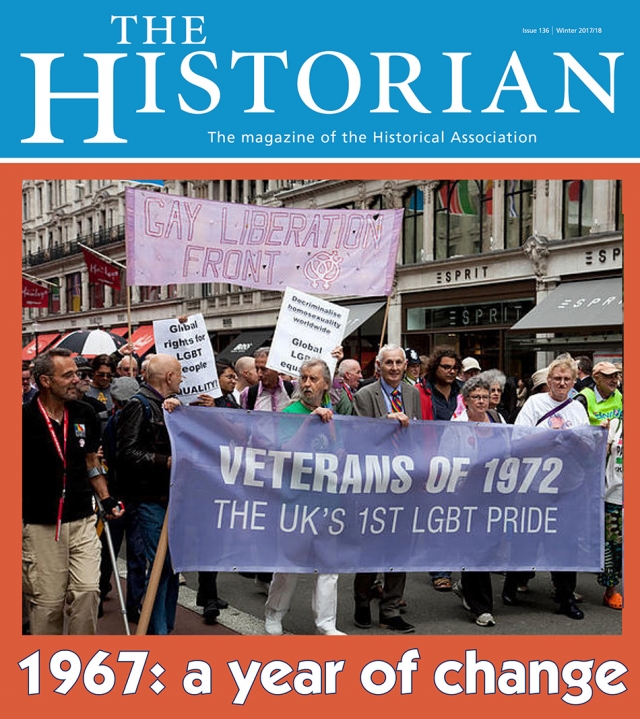The Historian 136: Out now
Journal news

1967: A Year of Change
Regular readers of The Historian will have noticed that our Editorial Board have been, over many years, identifying significant historical anniversaries which we feel are important to recognise. In this edition you will find three articles which deliberately identify the fiftieth anniversary of the Sexual Offences Act (1967) as a highly-significant turning-point in the social attitudes and expectations of our modern society. Two of these articles have been commissioned to enable two prominent historians to describe and analyse the changes that have occurred in our contemporary world, in how the community relates to and respects gay people. The third item focuses on the posthumous celebration of the life of Alan Turing, one of the most prominent victims of the repressive attitudes of earlier times.
When a very close friend heard what the principal emphasis of this edition of The Historian was to be, he responded to the effect that he felt that this emphasis was likely to be controversial. My answer to him was that historians describe, analyse and interpret people and events without fear or favour: and that, if we have carried out our commission with integrity, we should proceed wherever we feel that it is appropriate to research and explore; in other words, this should not be a matter of controversy.
Obviously historians, by virtue of their personal background, their political instincts and their experience, will often reach different conclusions, but the key criterion for judging our output is whether or not we have proceeded with integrity, because that will determine whether what we offer is authentic. In this context we can then disagree respectfully. Some years ago, for example, a complaint was made regarding a reference in a book review as to whether or not there had been an Armenian genocide a century ago. While it is certainly true that the majority view, so strongly still disputed by the Turkish authorities, is that a genocide of over one and half million people did take place, our internal enquiry produced the highly-relevant fact that the book reviewer had served for a time in Whitehall where, whilst the scale of deaths was not disputed, there was an internal civil service debate over whether the massive deaths of one ethnic or racial group amounts to genocide if there is insufficient evidence of a determination to eliminate such a group of people. The book reviewer in that particular instance had proceeded with integrity, even if we disagreed with his analysis and observation. The present-day equivalent would be whether we believe that the treatment of the Rohindra population in Myanmar amounts to an attempt at genocide or whether there is another explanation.
This edition of The Historian is very much focused on modern history. We are also offering an analysis of what happened in what we are describing as the fiftieth anniversary of the ‘Year of Reckoning’ (1968), when among other major incidents the assassinations of Martin Luther King and Robert Kennedy shook the world, along with the Russian suppression of the ’Prague Spring’ in Czechoslovakia. With this we are also including an important commentary on how the 1974 Birmingham Pub Bombings had an important role in stimulating modern-day approaches to first aid; and an unusual examination of the effect of the Battle of Jutland on the local people of Portsmouth.
I am most grateful to our contributors who have, as always, given freely of their time and, specifically on this occasion, to my colleague Paula Kitching for her various contributions. Please do speak to me or any other member of the Editorial Board at the Stratford-upon-Avon Conference: we do genuinely invite and appreciate your feedback.

